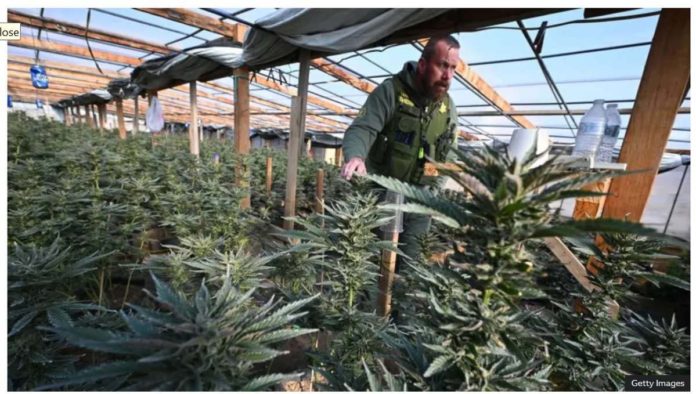
WASHINGTON – The United States’ Drug Enforcement Administration plans to reclassify marijuana as a less dangerous drug, a historic shift in drug policy.
At a federal level, marijuana is classified as a “Schedule I” drug, a category it shares with heroin, ecstasy and LSD.
Instead, it would be included among “Schedule III” drugs, which are considered less likely to be abused.
The move would be the most significant US drug policy change in over 50 years.
The Department of Justice will send its recommendation to reclassify marijuana to the White House Office on Management and Budget (OMB), according to two sources familiar with the plan.
An approval by the OMB would be followed by a public comment period and review by an administrative judge before the change is formalized and published.
While marijuana remains illegal at te federal level, 38 individual states have legalized it for medical purposes, and 24 have legalized it for recreational use.
What are Schedule I and Schedule III drugs?
Since 1971, marijuana has been a Schedule I drug, meaning that – in the federal government’s view – it has “no currently accepted medical use and a high potential for abuse.”
Schedule III substances, on the other hand, are defined by the DEA as drugs “with a moderate to low potential for physical and psychological abuse”.
Other drugs in this category include Tylenol with codeine, steroids, testosterone and ketamine.
Drugs in the Schedule III category are still controlled, and their unauthorized trafficking could still lead to federal criminal prosecution, although the penalties are less severe.
What would reclassification mean?
In practice, the move could also undercut the vast black market for the drug that continues to exist even in parts of the country where marijuana’s legal sale are regulated and subject to tax.
“When you legalize a compound, far more people would go to the legal market, just because it’s simple and people don’t have access to the black market. The illicit market would certainly dwindle,” Dr Carl Hart, a psychologist and neuroscientist from Columbia University who specializes in drug use and addiction told the BBC.
This shift, in turn, could ultimately help further drive down the already declining number of marijuana arrests made in the US each year.
“That’s extremely important,” Dr Hart said. “Cannabis arrests used to be well over a million every year, and as a result of legalization in various states, that number has dropped dramatically. With this move, it should drop even further.”
“That means fewer people will have to interact with law enforcement,” he added. “A lot of people get their introduction to the criminal justice system through marijuana.” (BBC)







